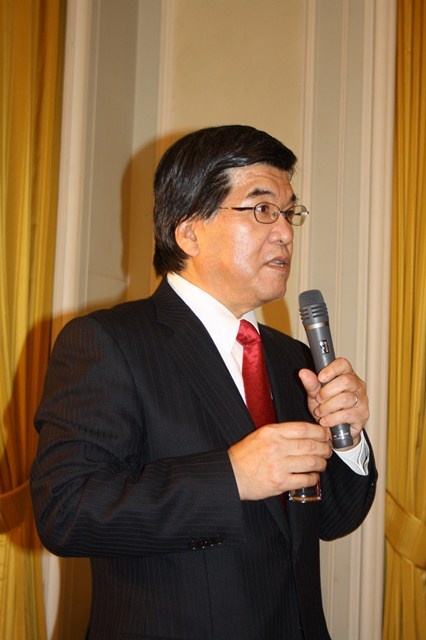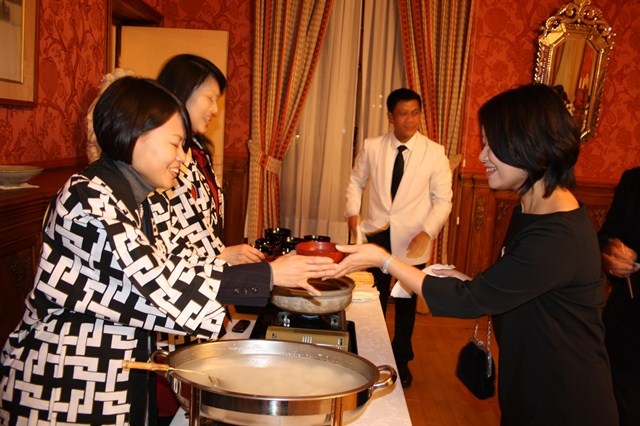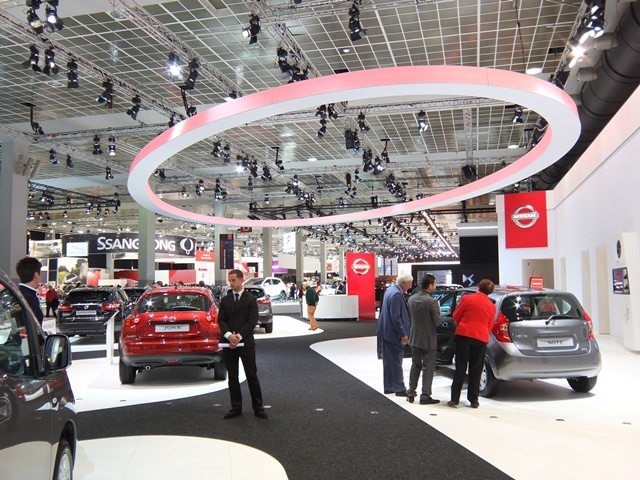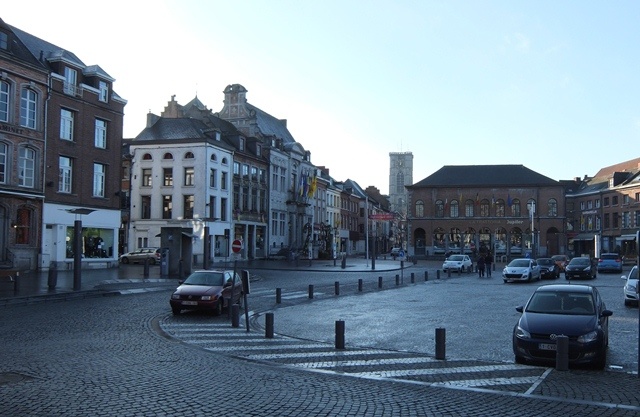Opening of the First New Year’s Reception by King Philip (No.41)
On the sixth of January France and several other European countries have a custom of eating the Galette of Kings, a pie cake with an almond cream filling. In this filling a small ceramic figurine, called a fava, is hidden (in the old days it used to be a horse bean). The other day, when reading a French newspaper, I saw a picture of President Hollande presenting and serving a huge galette to many guests at the Elysée Palace. This tradition seems to be linked to Christianity when followers of the Christian faith during the time of Ancient Rome in Asia Minor came together to eat, celebrating the baptism of Jesus Christ twelve days after his birth (the day of Epiphany) and wishing for good fortune. The ‘Kings’ in the name refers to the three shepherds from the east who appeared at the birth of Jesus Christ. Nowadays, it is a fun game in which the person who receives the piece with the fava inside is said to be blessed by a year of happiness. The other day, I was invited by a Belgian friend to a galette party at his home. Even though I had three pieces, unfortunately none of them had the figurine so I lost the chance of a year of good fortune. When Japanese think of a galette we think of the thin buckwheat flour crepes fried on a griddle in Bretagne. However, the Galette of Kings is a pie pastry and thus completely different.
<Opening of the first New Year’s Reception by King Philip>
 Three days ago, a New Year’s reception for diplomats was held by king Philippe at the Royal Palace in Brussels. As it is an annual event, it was the second time for me to have attended, but this time, it was the first New Year’s reception by the new king who was inaugurated in July of last year, which made it feel like a totally new experience. According to the master of ceremony of the palace, 163 ambassadors (the majority of them were accompanied by their spouses) and 23 Chargé d’affaires (due to absence of the ambassador etc.) attended. Every ambassador lined up in order of their time in office to express their New Year’s greetings to the king and queen Mathilde. After the king and queen made their round, the party was held in a different room, where the ambassadors were given the chance again to have an informal talk with the king and queen. When I got to address the king, I expressed the hope for his official visit to Japan in the near future. Queen Mathilde talked about her impressions of her visit to Japan as crown princess one and a half year ago, and said with a smile how she still continues to this day drinking matcha tea every morning. As Ambassador, I could not be happier by the increasingly closer and closer interaction between the Japanese and the Belgian imperial and royal households. Three days ago, a New Year’s reception for diplomats was held by king Philippe at the Royal Palace in Brussels. As it is an annual event, it was the second time for me to have attended, but this time, it was the first New Year’s reception by the new king who was inaugurated in July of last year, which made it feel like a totally new experience. According to the master of ceremony of the palace, 163 ambassadors (the majority of them were accompanied by their spouses) and 23 Chargé d’affaires (due to absence of the ambassador etc.) attended. Every ambassador lined up in order of their time in office to express their New Year’s greetings to the king and queen Mathilde. After the king and queen made their round, the party was held in a different room, where the ambassadors were given the chance again to have an informal talk with the king and queen. When I got to address the king, I expressed the hope for his official visit to Japan in the near future. Queen Mathilde talked about her impressions of her visit to Japan as crown princess one and a half year ago, and said with a smile how she still continues to this day drinking matcha tea every morning. As Ambassador, I could not be happier by the increasingly closer and closer interaction between the Japanese and the Belgian imperial and royal households.
<This year’s resolution: positive thinking—New Year’s party at the Ambassador’s Residence>
  Last week, the yearly New Year’s party was held at the Ambassador’s residence with about 120 Japanese representatives of the Japanese community such as member companies of the Nihonjinkai. It was the second time in a row for me as Ambassador to host the New Year’s party. Every guest got to taste ‘Osechi’, food typically served during New Year and just like last year “Oshiruko” (sweet red-bean soup with rice cake balls) was most popular. There was nothing new on the program, but we requested a Belgian Taiko group to perform at the opening of the evening. They gave us a thirty minute performance of fitting New Year music and we also had a sake-tasting corner. In my opening speech of last year I said I would stop complaining the coming year, and this year I made my resolution to think positively no matter what.yomoyama_041_newyear3It means that when in doubt about whether to do something or not, I will set myself to do it. Last week, the yearly New Year’s party was held at the Ambassador’s residence with about 120 Japanese representatives of the Japanese community such as member companies of the Nihonjinkai. It was the second time in a row for me as Ambassador to host the New Year’s party. Every guest got to taste ‘Osechi’, food typically served during New Year and just like last year “Oshiruko” (sweet red-bean soup with rice cake balls) was most popular. There was nothing new on the program, but we requested a Belgian Taiko group to perform at the opening of the evening. They gave us a thirty minute performance of fitting New Year music and we also had a sake-tasting corner. In my opening speech of last year I said I would stop complaining the coming year, and this year I made my resolution to think positively no matter what.yomoyama_041_newyear3It means that when in doubt about whether to do something or not, I will set myself to do it.  Of course, blindly going headlong at something will not get you anywhere, but missing chances due to negative thinking is a shame. When you think of attaining your goal with a concrete method, many of the seemingly impossible things become possible. The economic policy ‘Abenomics’ of Prime Minister Abe as well received negative feedback in the beginning from many economists. However, if you do not do anything for fear of failure, a new pathway cannot open. Taking decisions means also taking responsibility for the outcome. I believe that no-one can ‘advance’ without any ‘determination’, depending on one’s position or level. What do you think? Of course, blindly going headlong at something will not get you anywhere, but missing chances due to negative thinking is a shame. When you think of attaining your goal with a concrete method, many of the seemingly impossible things become possible. The economic policy ‘Abenomics’ of Prime Minister Abe as well received negative feedback in the beginning from many economists. However, if you do not do anything for fear of failure, a new pathway cannot open. Taking decisions means also taking responsibility for the outcome. I believe that no-one can ‘advance’ without any ‘determination’, depending on one’s position or level. What do you think?
<European Motor Show in Brussels>
  “The European Motor Show, which will be held over the next 10 days, opened yesterday in Brussels. I visited the show on the first day together with the members of the BJA on invitation by the Belgian Federation of Automobile and Cycles Industries (FEBIAC), the organising host. This day being designated “Japan Day”, the Japanese national hymn “Kimi ga yo” was played upon my arrival to the venue. About 100 various models of 9 Japanese car manufacturers, such as Toyota, were on display everywhere in the exhibition hall along with 43 leading global automobile manufacturers. Under the gentle guidance of Thierry van Kan, President of FEBIAC, I could visit the site for nearly two hours. This motor show hit its 92nd anniversary this year, so it is an event filled with history and tradition. Every other year the show is organised on a small and large scale and this year is the large event. As 650.000 visitors are expected in these 11 days, sales can be made on the spot and it is possible to get a substantial discount. The automobile market in Belgium is a small one with an annual sales volume of about 500.000 units. Moreover, it is a special market because half of those units are company cars lent to employees. Therefore, it is a bit surprising that such a big motor show keeps on going. “The European Motor Show, which will be held over the next 10 days, opened yesterday in Brussels. I visited the show on the first day together with the members of the BJA on invitation by the Belgian Federation of Automobile and Cycles Industries (FEBIAC), the organising host. This day being designated “Japan Day”, the Japanese national hymn “Kimi ga yo” was played upon my arrival to the venue. About 100 various models of 9 Japanese car manufacturers, such as Toyota, were on display everywhere in the exhibition hall along with 43 leading global automobile manufacturers. Under the gentle guidance of Thierry van Kan, President of FEBIAC, I could visit the site for nearly two hours. This motor show hit its 92nd anniversary this year, so it is an event filled with history and tradition. Every other year the show is organised on a small and large scale and this year is the large event. As 650.000 visitors are expected in these 11 days, sales can be made on the spot and it is possible to get a substantial discount. The automobile market in Belgium is a small one with an annual sales volume of about 500.000 units. Moreover, it is a special market because half of those units are company cars lent to employees. Therefore, it is a bit surprising that such a big motor show keeps on going.
<Another Free University of Brussels>
Last month, I visited Jan Cornelis, Vice Rector of the Vrije Universiteit Brussels (VUB) and learned about the current situation of the university education in Dutch and the several exchange programmes with East Asian universities. This university, which was split at the end of the language dispute in 1969, is the Dutch Free University of Brussels (the other one being the French ULB) with currently about 13,000 students. Characteristic of the VUB is the high ratio of foreign students (23%) and the many masters and doctorates. In the case of science postgraduates (engineering, medicine, biotechnology) in particular, half of the students are foreigners of whom the Chinese students alone amount surprisingly to nearly 200. China cooperated to the launch of the “Brussels Institute of Contemporary China Studies (BICCS)” at the university, establishing a structure for postgraduate level education ranging from topics on Chinese domestic politics and diplomacy to Chinese relations with the EU. The “EU-Korea Institute (EKI)” was also founded recently, enabling research on mainly Northeast Asian politics, economics, and security. Unfortunately, the relationship with Japan has dwindled and there are only a few exchange programmes with Yamagata University, Kyoto University and Kobe University. Also, new postgraduate courses, called the “Brussels Diplomatic Academy”,will be opened from 2014 on. The aim is the development of capable persons that can play an active part in the field of diplomacy and international business. It is more than fitting for an international city like Brussels to have such higher education available at a private university.
<The Procession of the Giants, Dark Streets and …>
 There is a small town called Ath with a population of 28.000 located about 60 km southwest of Brussels. This town is well known among the Belgians for its “Procession of the Giants”, which takes place every year on the fourth weekend of August. The festival was designated as a UNESCO world heritage in 2005. Various giant dolls, from Goliath to other figures from the Old Testament parade through the town. The giants’ legend spread in the region of northern France to the south of Belgium from ancient times and the “Procession of the Giants” in Ath as well has been around since the 15th century. Close to the city centre, there is a small exhibition hall called the “Giants’ House”, offering an introduction from the old stories about the giants to the “Procession of the Giants”. According to this, the “Procession of the Giants” was thought up for the purpose of making illiterate people in the late Middle Ages understand the stories of the Bible. Moreover, there are a couple of old castles such as the castle of Beloeil and the castle of Attre near Ath, making it a bit of a sightseeing spot. The other day in the weekend, I went on a drive to go see this area, but what surprised me about Ath was that unlike other Belgian towns, the church did not face the centre square of the town, but it was located on the edge of town. Furthermore, due to the tall buildings on the south side blocking the sunlight even during the short days of winter, the whole town feels dark even during the daytime. This being said, according to the “Suicide Statistics” of 2010 reported to the Belgian parliament at the end of last year, the province with the highest suicide rate was the province of Hainaut, which includes the town of Ath. The suicide rate of Ath, with 25 per 100.000, is remarkably high. I do not know if there is any common ground between the Procession of the Giants, the dark streets and the suicides, but it was a drive that got me thinking a lot. There is a small town called Ath with a population of 28.000 located about 60 km southwest of Brussels. This town is well known among the Belgians for its “Procession of the Giants”, which takes place every year on the fourth weekend of August. The festival was designated as a UNESCO world heritage in 2005. Various giant dolls, from Goliath to other figures from the Old Testament parade through the town. The giants’ legend spread in the region of northern France to the south of Belgium from ancient times and the “Procession of the Giants” in Ath as well has been around since the 15th century. Close to the city centre, there is a small exhibition hall called the “Giants’ House”, offering an introduction from the old stories about the giants to the “Procession of the Giants”. According to this, the “Procession of the Giants” was thought up for the purpose of making illiterate people in the late Middle Ages understand the stories of the Bible. Moreover, there are a couple of old castles such as the castle of Beloeil and the castle of Attre near Ath, making it a bit of a sightseeing spot. The other day in the weekend, I went on a drive to go see this area, but what surprised me about Ath was that unlike other Belgian towns, the church did not face the centre square of the town, but it was located on the edge of town. Furthermore, due to the tall buildings on the south side blocking the sunlight even during the short days of winter, the whole town feels dark even during the daytime. This being said, according to the “Suicide Statistics” of 2010 reported to the Belgian parliament at the end of last year, the province with the highest suicide rate was the province of Hainaut, which includes the town of Ath. The suicide rate of Ath, with 25 per 100.000, is remarkably high. I do not know if there is any common ground between the Procession of the Giants, the dark streets and the suicides, but it was a drive that got me thinking a lot.
|